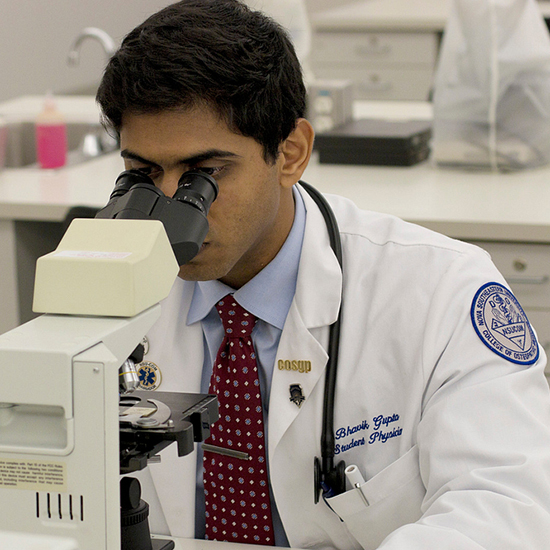Access Best-In-Class Medical Training
Join students, faculty, and a teaching community that is committed to cutting-edge care that puts the patient first. As a medical student at Nova Southeastern University's College of Osteopathic Medicine, you’ll gain immediate access to the real world of medicine by studying in clinical settings within your first month of study. Local and international outreach programs will help you develop a deep understanding of how to meet the needs of the medically underserved. And our interprofessional curriculum gives you the sought-out skill set of a comprehensive understanding of health care.
The two professional programs include the Doctor of Osteopathic Medicine (D.O.), and the Doctor of Marriage and Family Therapy (D.M.F.T.); each one has different admission requirements and steps. Read on to learn more about each program’s admission requirements, deadlines, and more.
Professional Program Application Deadlines
Please note that the college receives more than 7,500 completed applications per year.
It is in your best interest to apply as early as possible.
D.O.
January 15:
AACOMAS App Due
March 1:
NSU Supplemental App Due
D.M.F.T.
January 15:
Priority Deadline
June 30:
Final, Based on Seat Availability
D.O. Admission Requirements

Apply to the Doctor of Osteopathic Medicine Program
Admission to the D.O. program at NSU's College of Osteopathic Medicine is available at two entry points: dual admission for those seeking both an undergraduate and graduate degree track, or direct entry into the D.O. program for those who hold a master’s degree.
If you’re a high school student ready to pursue a doctorate in osteopathic medicine, you can start working toward your goal as an undergraduate enrolled in dual admission. Your spot in the D.O. program will be held while you earn your bachelor’s degree.
Apply to the D.O. Program Apply for Dual Admission
View our Frequently Asked Questions or contact the Office of Admissions at hpdadmissionsinfo@nova.edu if you have additional questions.
Part One: Apply with AACOMAS
NSU Osteopathic Medicine participates in the American Association of Colleges of Osteopathic Medicine Application Service, which provides an interactive, web-based application that can be accessed through aacom.org for the receipt and processing of all applications. AACOMAS takes no part in the selection of students.
Part Two: NSU Osteopathic Medicine Online Secondary Application
Upon receipt of the completed AACOMAS application, NSU will forward YOU an online secondary application. You should submit the following materials to Nova Southeastern University no later than March 1.
Family Therapy Admission Requirements

Two Ways to Study Family Therapy
The Department of Family Therapy at NSU offers two postgraduate tracks: the Doctor of Philosophy in Couple and Family Therapy (Ph.D.) and the Doctor of Marriage and Family Therapy (D.M.F.T.). Both programs provide you with innovative, interdisciplinary coursework and practicum experience.
What sets the two tracks apart is the D.M.F.T. degree program is specifically designed to produce professionals whose chief contributions will be in the clinical rather than academic sphere. Each program has its own admissions process and deadlines.
Ready for the Next Step?
Let’s get started! First things first, to apply, you must have—or be in the process of completing—a master’s degree. And you must possess a master's degree from a licensing degree before you can begin doctoral studies.
A Note about Deadlines
Due to the competitive application pool, it is recommended that you start your application process at least 1-2 months prior to the deadline dates. The Office of Admissions processes applications on a year-round basis.
Priority application deadline for Fall/August admission: January 15 Late application deadline for Fall/August admission: June 30 (based on seat availability)
Go to ApplicationSubmitting Your Materials
Please email all documents to: admitdocs@nova.edu
Mailing Address (Domestic)
Nova Southeastern University
Enrollment Processing Services
Attn: College of Osteopathic Medicine
3301 College Avenue, P.O. Box 299000
Fort Lauderdale, Florida 33329-9905
Fax unofficial documents to (954) 262-3609 or email the Office of Graduate Admissions.
Mailing Address (International)
For International Students:
Nova Southeastern University
Attn: Enrollment Processing Services
3301 College Avenue
Fort Lauderdale, Florida 33329-9905
Please note that NSU reserves the right to rescind or place conditions upon admissions offers should information become available that calls into question an admitted student’s academic performance or character, including that which reflects a violation of NSU’s Code of Student Conduct.
Family Therapy Programs
Transfer students must meet the program admissions criteria. The courses that may be transferred into the program will be determined on a case-by-case basis and must be deemed comparable in level, content, and rigor to those within the D.M.F.T. program.
D.O. Program
- Make sure you meet all admissions requirements, including submitting official transcripts of all college work (including osteopathic transcripts), MCAT scores, National Board scores if available, and letters of evaluation
- Demonstrate good standing at the transferring institution, as documented by a letter from the dean of the transferring institution
- Provide a letter of recommendation from a faculty member of the transferring institution
- Provide a written statement outlining reasons for request for transfer
Please note that approved transfers may come only from medical school programs accredited by LCME or COCA.
Foreign nationals who reside outside the United States at the time of application and whose native language is not English must present evidence of proficiency in English by satisfactorily completing the Test of English as a Foreign Language (TOEFL). Score requirements are as follows: minimum paper score = 550; minimum computerized score = 213; minimum Internet score = 79. A score of 6.0 on the International English Language Testing System (ILETS) exam is accepted in lieu of the TOEFL.
For a full list of English proficiency tests that are accepted by the university, please visit International Students. Test scores must be submitted to the admissions office. For a TOEFL application information, visit the website at TOEFL or write to:
TOEFL
Educational Testing Services
Princeton, New Jersey 08540
(609) 771-7100
Applicants who have attended foreign universities or colleges are required to have their academic credentials evaluated for U.S. institutional equivalence. While there are several credential evaluators, the most widely used companies are listed below, or visit NACES.
World Education Services, Inc.
P.O. Box 745
Old Chelsea Station
New York, New York 10113-0745
(212) 966-6311
www.wes.org
Josef Silny & Associates
7101 SW 102nd Avenue
Miami, Florida 33173
(305) 273-1616
www.jsilny.org
Educational Credential Evaluators, Inc.
P.O. Box 514070
Milwaukee, Wisconsin
53203-3470
(414) 289-3400
www.ece.org
International students are encouraged to contact the Office of International Student Services at (954) 262-7240 or 800-541-6682, ext. 27240, or by emailing International Students or visiting the International Students web page.
Resident Alien students are required to submit a copy of their Resident Alien card.
The Dr. Kiran C. Patel College of Osteopathic Medicine is pledged to the admission and matriculation of qualified students and wishes to acknowledge awareness of laws that prohibit discrimination against anyone on the basis of race, color, religion or creed, sex, pregnancy status, national or ethnic origin, non-disqualifying disability, age, ancestry, marital status, sexual orientation, gender, gender identity, military service, veteran status, or political beliefs or affiliations. Regarding those students with verifiable disabilities, the university and College of Osteopathic Medicine will not discriminate against such individuals who are otherwise qualified but will expect applicants and students to meet certain minimal technical standards (core performance standards) as set forth herein, with or without reasonable accommodation.
In adopting these standards, the university and College of Osteopathic Medicine believe it must keep in mind the efficacy and safety in the learning environment, as well as the ultimate safety of the patients who some of its graduates will eventually serve. Specifically, the standards reflect what the university and College of Osteopathic Medicine believe are reasonable expectations required of future osteopathic physicians in performing common functions. Any exceptions to such standards must be approved by the dean of College of Osteopathic Medicine based upon appropriate circumstances.
Honor and integrity are essential and depend on the exemplary behavior of the individuals in their relations with classmates, patients, faculty members, and colleagues. This includes accountability to oneself and to relationships with fellow students, future colleagues, faculty members, and patients who come under the student’s care or contribute to the student’s training and growth, as well as members of the general public. This applies to personal conduct that reflects on the student’s honesty and integrity in both academic and nonacademic settings, whether or not involving an NSU-sponsored activity. All students must have the capacity to manage their lives and anticipate their own needs. Upon accepting admission to NSU College of Osteopathic Medicine, each student subscribes to, and pledges complete observance to, NSU’s Student Code of Conduct Policies. A violation of these standards is an abuse of the trust placed in every student and could lead to suspension or dismissal.
Students in the Doctor of Osteopathic Medicine degree program must have, with or without reasonable accommodation, multiple abilities and skills including intellectual, conceptual, integrative, and quantitative abilities; interpersonal communication; mobility and strength; motor skills; and hearing, visual, tactile, behavioral, and social attributes. Students must be able to perform these abilities and skills in a reasonably independent manner. Osteopathic physicians must have the knowledge and skills to function in a broad variety of clinical situations and to render a wide spectrum of patient care. In order to carry out the activities described below, students in the Doctor of Osteopathic Medicine Program at College of Osteopathic Medicine must be able to integrate consistently, quickly, and accurately all information received. They must also have the ability to learn, integrate, analyze, and synthesize data.
Intellectual, Conceptual, Integrative, and Qualitative Abilities
Students must have critical thinking ability sufficient for problem solving and good clinical judgment. This is necessary to identify cause/effect relationships and to develop plans of action or plans of care. In addition, students should be able to comprehend three-dimensional relationships and to understand the spatial relationships of structures. Students are expected to be able to perform multiple tasks in a diverse, dynamic, highly competitive, and challenging learning environment. They must be able to think quickly and accurately in an organized manner, despite environmental distractions. Examples include, but are not limited to, identification of cause/effect relationships in clinical situations, development of treatment plans, transferring knowledge from one situation to another, evaluating outcomes, problem solving, prioritizing, and using short- and long-term memory.
Interpersonal Communication
Students must be able to interact and communicate effectively with respect to policies, protocols, and process—with faculty and staff members, students, patients, patient surrogates, and administration—during the student’s educational program. They must be able to communicate effectively and sensitively with patients. Communication includes not only speech, but also reading and writing. Students must also be able to communicate effectively and efficiently in all written forms with all members of the health care team. They must have interpersonal abilities sufficient to interact with individuals, families, and groups from a variety of social, emotional, cultural, and intellectual backgrounds.
Students must have sufficient proficiency with English to retrieve information from texts and lectures and communicate concepts on written exams and patient charts; elicit patient backgrounds; describe patient changes in moods, activity, and posture; and coordinate patient care with all members of the health care team. Students must be able to communicate or provide communication in lay language so that patients and their families can understand the patient’s conditions, treatment options, and instructions. Students must be able to accurately enter information in the patient’s electronic health record, according to each program’s requirements.
Motor Skills
Osteopathic medicine students must have sufficient motor function to execute movements reasonably required to provide general care and emergency treatment to patients. Examples of emergency treatment reasonably required of some health care professionals are cardiopulmonary resuscitation (CPR), administration of intravenous medication, the application of pressure to stop bleeding, the opening of obstructed airways, and the ability to calibrate and use various pieces of equipment. Such actions require coordination of both gross and fine muscular movements, equilibrium, and functional use of the senses of touch and vision.
Strength and Mobility
Students must have sufficient mobility to attend emergency codes and to perform such maneuvers as CPR when required. They must have the physical ability to move sufficiently from room to room and to maneuver in small places. Osteopathic medicine students must have the ability to position patients for the administration and delivery of osteopathic manipulative treatment in a variety of settings and to position and move patients when required.
Hearing
Students must have sufficient auditory ability to monitor and assess auditory communication, when necessary. Osteopathic medicine students must be able to hear information given by the patient in answer to inquires; to hear cries for help; to hear features in an examination, such as the auscultatory sounds; and to monitor equipment.
Visual
Osteopathic medicine students must have visual ability sufficient for observation, assessment, and rendering of treatment necessary in patient care. It must be consistent in many cases with being able to assess asymmetry, range of motion, and tissue texture changes. Osteopathic medicine students must have sufficient visual ability to use ophthalmologic instruments. It is necessary to have adequate visual capabilities for proper evaluation and treatment integration. Students must be able to observe the patient and the patient’s responses, including body language and features of the examination and treatment.
Tactile
Osteopathic medicine students must have sufficient tactile ability for physical assessment. They must be able to perform palpation and functions of physical examination and/or those related to therapeutic intervention. Osteopathic medicine students must be able to use tactile senses to diagnose directly by palpation and indirectly by sensations transmitted through instruments.
Sensory
Osteopathic medicine students are required to have an enhanced ability to use their sensory skills. These enhanced tactile and proprioceptive sensory skills are essential for appropriate osteopathic evaluation and treatment of patients.
Interview Day
- The candidate experience is a full day and includes:
- Meeting the NSU College of Osteopathic admissions counselor
- Information regarding the admissions committee decision process
- Overview presentation of the curriculum, facilities, and student support
- Private interview with a small team of faculty members
- Tour of the medical college facility by students ambassadors
- Experience NSU as a student (activities vary)
- Interactive lunch session
- Q&A with the dean of NSU College of Osteopathic Medicine
- Campus bus tour (optional)
Need to check on your application file? Call Enrollment Processing Services at 1-877-640-0218 or email us.
Nova Southeastern University, Dr. Kiran C. Patel College of Osteopathic Medicine, Doctor of Osteopathic Medicine Program is an AOA-accredited program of study. Graduation from an AOA-COCA accredited college of osteopathic medicine is required in order to begin training in an AOA- or ACGME-accredited residency program to which he or she has been accepted, and to take the COMLEX-USA Level 3 examination. At this time, we have determined that the KPCOM program meets the educational degree completion requirements for licensure in all 50 states, the District of Columbia and the US protectorates, as defined in 34 CFR §600.2.
After Applying, What Happens Next?
If selected, you’ll receive an invitation from the Office of Admissions to schedule an interview. This personal interview is the next step and does not guarantee admission. Acceptance is on a “rolling” or periodic schedule, and you will receive decision notices via email and mail.

